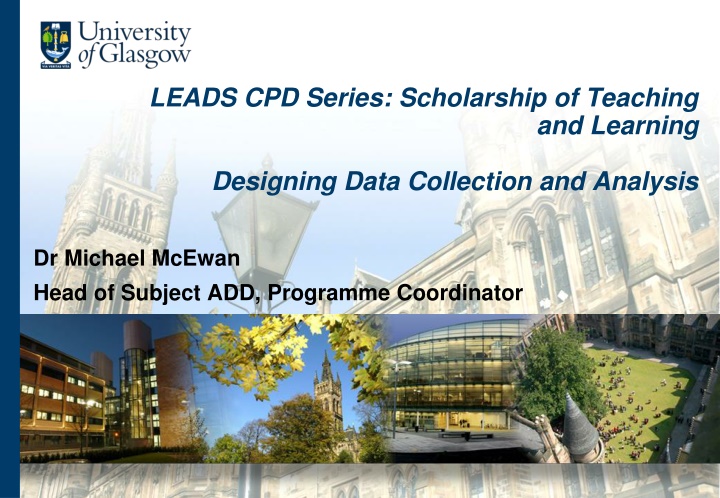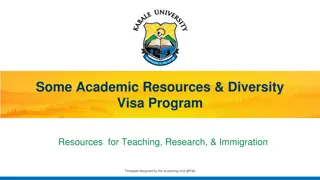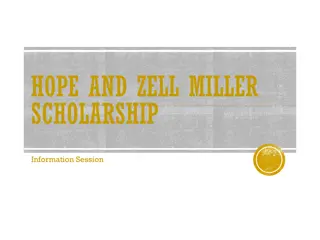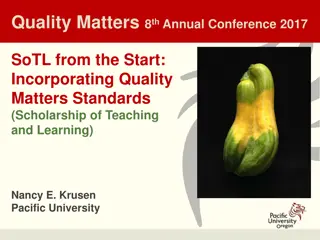Enhancing Scholarship of Teaching and Learning through Data Collection and Analysis
Explore the intricacies of designing data collection and analysis methods in the Scholarship of Teaching and Learning with Dr. Michael McEwan. Learn about formulating research questions, turning goals into researchable questions, and preparing for scholarly inquiries. Discover Glassick's Framework for designing projects and delve into examples of research questions related to student engagement and tutorial participation.
Download Presentation

Please find below an Image/Link to download the presentation.
The content on the website is provided AS IS for your information and personal use only. It may not be sold, licensed, or shared on other websites without obtaining consent from the author.If you encounter any issues during the download, it is possible that the publisher has removed the file from their server.
You are allowed to download the files provided on this website for personal or commercial use, subject to the condition that they are used lawfully. All files are the property of their respective owners.
The content on the website is provided AS IS for your information and personal use only. It may not be sold, licensed, or shared on other websites without obtaining consent from the author.
E N D
Presentation Transcript
LEADS CPD Series: Scholarship of Teaching and Learning Designing Data Collection and Analysis Dr Michael McEwan Head of Subject ADD, Programme Coordinator
Todays session This session moves from formulating scholarship questions towards deciding how you ll answer them. What counts as data? What kind of data do you need? How can you plan your data collection, management and analysis? 1
A framework for design Glassick s Framework: 1. Clear goals 2. Adequate preparation 3. Appropriate methods 4. Significant results 5. Reflective critique 6. Effective dissemination Designing any project starts with your question. Methods always follow from that! 2
Turning goals into scholarship questions Researchable Questions Deep Thought Interesting Relevant Feasible Ethical Concise Answerable Motivating but not to the point of introducing bias Addresses a gap within a specific context Bounded scope Although we will address ethics later, ethics need to be considered from the outset Precise and defined Consider your interrogatives! Green, N. (2016) Formulating and refining a research question , in: Gilbert, N. (ed.) Researching social life, 4th ed. London: SAGE, pp.43-60. 3
Formulating the question/statement The relationship between student preparation and participation in tutorials: What is the relationship between the amount of time level 1 History students in my tutorial group report that they spend on tutorial preparation and the number and quality of comments they make in a tutorial? Do you have any goals we could work with for this session? The effect of introducing problem-solving activities in a lecture on student engagement: An exploration of level 3 Pharmacology students perceived engagement in response to a lecture with problem solving activities in comparison to lectures without such activities 4
From goals to preparation Researchable Questions Deep Thought The literature What is already known about your goal? Can you define the gap ? How have other tackled similar questions? Cleaver, E., Lintern, M., McLinden, M., & Askews & Holts Library Services. (2014). Teaching and learning in higher education: Disciplinary approaches to educational enquiry. London: SAGE Publications Ltd. 5
Appropriate methods How will you develop valid knowledge Epistemology What is your interconnected design for collecting data and generating knowledge Methodology What tools will you use to collect data Methods Adequate Preparation: are you building on the work of others? What have other done? 6
What counts? Epistemology will influence your research design because it will impact on your view of what is acceptable/valid knowledge. As will your discipline Knowledge as experience Knowledge as communicable Which is why you start with your question/goals! Knowledge as empirical data Knowledge as action This will impact on what you believe to be valid data which will, in turn, impact on your methods for collecting that data. 7
Impact on methodologies Do you want to know about experiences and actions? QUALITATIVE Do you want to find overwhelming evidence and try to prove something or generalise? QUANTITATIVE Or is it a bit of both? 8
Mixed Methods: triangulation Quantitative Qualitative Sequential Explanatory Design Qualitative Quantitative First step informs the latter step Sequential Exploratory Design 9
Mixed Methods: triangulation Concurrent Triangulation Quantitative Concurrent Nested Triangulation Qualitative Quantitative Qualitative 10
What Data? Level 2a: Modification of attitudes and perceptions Level 2b: Acquisition of knowledge and skills Level 1: Learner's reactions/preferences Level 3: Change in behaviour the impact of practice/intervention on students in terms of the activities/behaviours engaged in a measure of the student learning process student outcomes in terms of assessments or declared knowledge/skills a more definitive measure of student performance and learning level of motivation, engagement, enthusiasm these can be seen as proxies of student learning e.g. student satisfaction, NSS, course evaluations all proxies of student learning. Adapted from Morrison J. 2003. ABC of learning and teaching in medicine: Evaluation. British Medical Journal 326:385 387. 11
What Data? L1: Learner Preferences L2: Attitudes L3: Student Learning Gains L4: Behaviour Course evaluations Observational data Assessment data Intervention data NSS Validated instrument Pre-entry data Observational data PTES Confidence logs Stakeholder views Big data Validated instrument Attendance data Pre-post test Longitudinal data CATs Competence tests Big data Crowdsourcing methods
Methods for Collecting Data Crowdsourcing methods 13
Useful References Cleaver, E., Lintern, M., McLinden, M., & Askews & Holts Library Services. (2014). Teaching and learning in higher education: Disciplinary approaches to educational enquiry. London: SAGE Publications Ltd. Cohen, L. M., & Manion, L. (1979). L. & Morrison, K.(2011) Research methods in education. UK: Routledge. Creswell, M. (2003) Research Design: qualitative, quantitative and mixed emthods approaches, 2nd ed. London: SAGE Publications Ltd. Green, N. (2016) Formulating and refining a research question , in: Gilbert, N. (ed.) Researching social life, 4th ed. London: SAGE, pp.43-60. Morrison J. 2003. ABC of learning and teaching in medicine: Evaluation. British Medical Journal 326:385 387. 14























